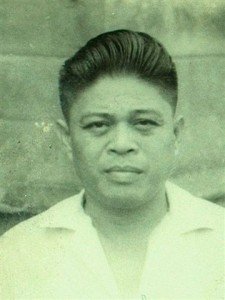 “Incurable!”
“Incurable!”I could hardly take the word, I mean, the comment of my professor on my reading. I went to my seat and shrank in embarrassment. I almost cried, not because I had read badly (in fact, I rattled off so fast that the terminals were carelessly left out), but because that word reminded me of the incurable cancer that had encroached the lungs of my father and had slowly sapped his youthfulness. It would have sounded a very wise excuse for crying, but it did not. It was just as well that I kept a sense of humor, otherwise, I would have been haunted to madness by that irksome word.
“For heaven’s sake, why use that word?” I murmured, as silently as I could.
“What?” the person seated next to me asked.
“Nothing. It’s none of your business.” I forced a smile.
Then I found myself thinking about my father. He was still in the prime of life, but that life had begun to darken. But then, I felt that there wouldn’t be any last supper at all – not this day or ever. I pictured my father blowing cake candles for his fiftieth birthday with a tinge of sadness. But for Papa it was different. He pictured himself slicing his 55th birthday cake, for he was anxious to see us all finish schooling. And I was proud of him for that.
On evenings when we lay awake, listening to the faint wash of the tide and watching the moon climb over the horizon, he used to tell me: “If God will only give me a life long enough to witness your ordination day…” He would never finish that sentence, or I thought, he hadn’t, because a lump would form in his throat and he had to clear it in embarrassment. Or sometimes, he would just sigh and turn his head away.
Never have I been challenged in my life like that. Here’s a man willing to live, to suffer, to sweat it out, for me and my vocation. It kept on troubling me, somehow. I could not snuff it out from my mind during meditation periods, especially these days when the willing victim is most likely to die. It is not enough to be willing to live. My father’s spirit was willing, but his flesh was weak. Oftentimes, I saw the crucial struggle between the spirit and the flesh inside him. But the worst thing is that, someday the spirit would yield, so would I think. It was a reality to be accepted.
There was an explosion of laughter and hooting around me. I was startled. Then I felt my face getting hotter. But it was not for me. No, not me, again! Somebody mispronounced a word when he read his piece.
“Too bad for a seminarian to mispronounce the word, ‘heaven’,” the professor remarked bluntly as he wrote HIVIN on the blackboard. They laughed again. I smiled.
“Sorry,” the seminarian excused himself and sat down in utter disgust.
I had never been so consoled for two weeks, and never, never so glad of the consolation: HEAVEN. What a lovely word for my father! But why now when we most need him? Can he just wait and live a little longer to support the family? Oh God, how I hated everybody. I hated the doctors, I hated the cancer. I hated everything, everybody. I frowned at all, but one, the parish priest. How can I hate him who was taking pains to make sure that my father received the spiritual aid he needed?
The last time I saw my father during summer vacation, before I went back to the seminary, I told him: “Pa, we owe so much to the priest. He’s concerned about you and about the best things you need…And don’t ever waste his efforts…do your best, too.”
“Don’t worry about me. I’ll be well in a week’s time. Only my body seems to go the other way, which makes it two,” father answered humorously, without success.
“That’s the best thing I’ve heard this day. I’ll be glad to see you well again.”
Then I kissed him on the cheek. The skin was old and dry, like a parchment, with his whole life written on it. I was waiting for the one good word that would crack the ice round my heart, and let the spring flow and the tears run. But the best that I could find to say was banality.
“I love you, Pa.” I turned my back, picked up my bags, and I saw the approaching bus with misty eyes. Of all the loving days, that, I believe, was the simplest, the most joyful, yet the most hurting. We were not children. Neither of us was innocent. We had eaten the apples of knowledge and found them bitter. The moment would come, and we both knew and were prepared for it, that we must leave each other. Whoever would be the first, it would still be going home to where he belonged.
All of a sudden, the porter interrupted the class and gave something to me – a message from my mother. With tears brimming in my eyes, I snatched a few clothing, never forgetting the sotana, of which Papa was very proud, I went home.
At last, Papa was going to where he belonged.
You can follow any responses to this entry through the RSS 2.0 feed. You can leave a response, or trackback from your own site.